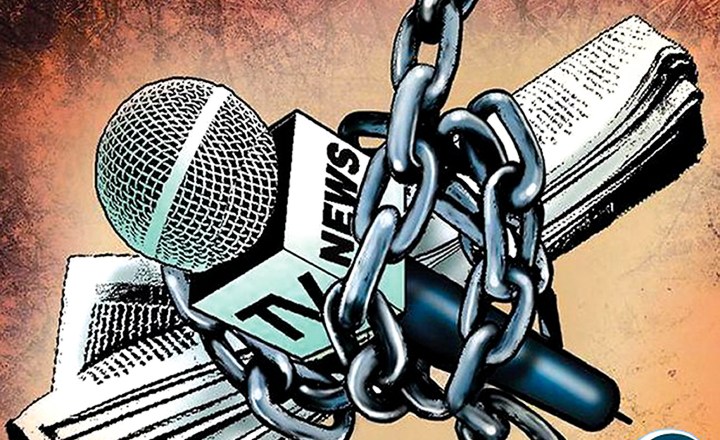FREE SPEECH OP-ED
The warning signs are there — freedom of expression in South Africa is under threat

Freedom of expression is like the canary in the coal mine when it comes to our rights. Because it involves such a fundamental need, it underpins many other rights and can offer early warning signs that a country is running into trouble.
A new report by the Campaign for Free Expression (CFE) tries to read across different fields — the media, the arts, gender and sexual rights, the right to protest, etc — to get a sense of where South Africa is when it comes to realising the right to free expression.
The report is not complete and doesn’t cover areas such as freedom of expression and religion, or deal with migrants, prisoners, people with disabilities, or free expression in universities. But it suggests that things aren’t looking that good. It might not be that the canary has stopped singing, but it has changed its tune and there are long and ominous pauses between some of its notes.
South Africa is a contradictory landscape. Mostly, and in many ways, we do have the right to speak, and this is often protected by the courts. The recent backhand a high court gave the attempt by former President Jacob Zuma to silence journalist Karyn Maughan is one example, as is a similar response meted out to the Moti Group.
The Constitutional Court sending Rica — the surveillance legislation — back for parliamentary review is another. Writers appear to write what they like, actors play whoever they want to play, and rock bands tell police cars to “Fokof”, with only the church doors wailing. There is even a new theatre and dance policy that wants to reconnect to the spirit of the 1990s and use “church and community halls as well as people’s homes (garages, backyards, lounges)” as venues.
As the policy recognises, there are important questions to ask in a country as diverse and as unequal as South Africa about how freedom of expression can best be enabled.
So far, so good. On the face of it, we’re a long way from, say, a country where journalists and bloggers are imprisoned and tortured, where people speak in hushed voices when they criticise the state, or where homosexuality is outlawed and punishable by death.
But, as the CFE review suggests, whether by intent, chance or sheer negligence, it is not entirely true to say we’re not heading in that direction either.
An example that speaks of a few issues at once involved a female reporter who tried to interview the Economic Freedom Fighters’ Mgcini Tshwaku, a member of the mayoral committee for safety and security, during the launch of a crime prevention project in Johannesburg. The journalist was shoved to the ground by the party’s supporters, and then stepped over as she lay there. Not just by the EFF apparatchiks who shoved her, but by Joburg Metro Police Department officers too, apparently there to keep the peace. This should alarm us.
It should also alarm us when in Kwanokuthula, Plettenberg Bay, a journalist had to move out of her home and her byline was taken off her stories after the community she lived in threatened her because she had written about xenophobic violence.
These incidents are not isolated and it’s hard to dismiss them simply as part of a robust democracy finding its feet. It’s also not easy to dismiss police repeatedly defying standing orders on how to treat journalists, or journalists being hit by rubber bullets when police open fire on crowds — in at least one incident, it seems that reporters were deliberately shot at. This should concern us, as much as we should be concerned when a journalist is beaten up by the police, and then assaulted again when he opens a criminal case.
No laughing matter
We should be concerned when the playwright Pieter-Dirk Uys has to explain in a “disclaimer and warning” to a book of his scripts that he did not change his work “to reflect today’s values and current sensibilities”, and that he used irony and satire in his particular form of resistance during apartheid.
We should be concerned because he has to explain this to avoid backlash — and we should be concerned when stand-up comics say they now censor their jokes for the same reason; even Trevor Noah, who might be one of the most warm-hearted comedians out there.
We should be concerned when private art galleries take down art because the staff threaten to leave if they don’t, or when online platforms stop selling an artist’s work because there are public objections.
We should be concerned when the film Inxeba (The Wound) gets re-rated so it is almost invisible after an objection lodged at the Film and Publication Board (FPB), which, among other things, tried to get the film classified as “blasphemous”.
We should be concerned when we see that the FPB is trying to position itself as a new apartheid-like censor bureau, including trying to “cancel” the screening of Black Girl, a debut film by Senegalese director Ousmane Sembène at the Joburg Film Festival. Thankfully, the festival organisers took a stand.
We should be concerned by the ongoing corruption in arts funding, with buddies of buddies benefiting, and new (and mostly struggling) artists shut out.
We should be concerned when police open fire on protesting artists in Mbombela in Mpumalanga, “at close range and without warning” because they refused to disperse until a memorandum was handed over.
We should be concerned when senior party leaders, including a Cabinet minister, make disparaging remarks about the media or refuse to answer questions, or spokespeople turn off their phones for good.
We should be concerned that laws are persistently drafted in a way that we need to claw back our rights through sometimes fruitless submissions and expensive applications to the courts. By default. Take for instance, the General Intelligence Laws Amendment Bill, which is described as having elements that pose a serious threat to free expression, and to the rights of association and religion, and serious intrusions into privacy, including weakened oversight of the state’s security agencies. This was after the Constitutional Court sent Rica back for review.
We should be alarmed when it is reported that over eight months in 2021 at least two LGBTQI+ people were murdered in SA each month, apparently for being different. We should be alarmed at the death threats and rape threats women receive on their cellphones when they voice an opinion.
We should be alarmed when 276 targeted killings are recorded in South Africa over two years, the highest among the African countries included in an index, and higher than in Brazil and India with populations many times our size. Many of these killings were linked to freedom of expression.
We should be alarmed when we learn that journalists are prevented from investigating organised crime by threats to their safety; or when an MP threatens to “assassinate” an editor.
All of this should concern us. It shows a pattern emerging. It suggests not just a lack of a shared understanding of what freedom of expression entails, but little common conviction that it’s even essential for a functioning society. Taken together, it says we need to pay much more attention to the canary’s faltering song. DM
Alan Finlay is a lecturer in Journalism and Media Studies at the University of the Witwatersrand. He compiled the Campaign for Free Expression report The Landscape is Darkening: A review of the state of free expression in SA.




















 Become an Insider
Become an Insider
Due to the so called freedom fighters,but now they implementing communist vitriol(control the citizens)
Freedom of speech in South Africa is pearl before swine. Perhaps it’s because relatively speaking, freedom came too easily, the local culture forgot about oppression becoming more interested in patronage and extortion than anything democracy could offer.
Agree, but you left out an important part of freedom of expression. You know what I mean. Something you wanted to say but could not. You yourself cant say it. Some smaller parts of scociety are not allowed to express themself as the bias narrative has been set. They cant even comment on social media in a rational way without being rediculed by the irrational bias. Some can say what they want. Others cant. Those who say what they want and hurts others are protected in law and grows in popularity. It shows a society being led by the weak and dishonest. The weakest morals, provides power to the populist. Its doomed, yet its popular, just like a quarter loaf.
Thank you Alan for building awareness of this threat.
What happened when the EFF and the police committed violence against the female journalist? The EFF has a long history of acting against journalist, throwing out a European journalist at one of its media feedback sessions, the exclusion of certain media houses from its activities, the violence against a female journalist in Cape Town, the pushing against the wall of an photographer by an EFF leader at parlement
Julius and his cohorts seem to be untouchable, look at the recent case regarding discharging a firearm. Despite all the proof he is getting away with it.
It’s sad to see that freedom of expression is under threat when the ilk of operation dudula goose-step around threatening the lives of foreign nationals! Are they now the example for freedom of expression – The far right given free reign, whilst artists like Pieter Dirk Uys have to explain and defend their method of resistance against the apartheid regime?